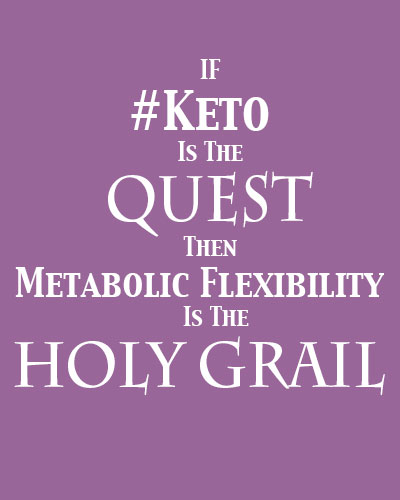 Yesterday morning during my first walk of the day I must have had Monty Python and the Holy Grail on my mind as I ran through my coaching lineup for the day, because the phrase pictured to the right kept popping into my head…
Yesterday morning during my first walk of the day I must have had Monty Python and the Holy Grail on my mind as I ran through my coaching lineup for the day, because the phrase pictured to the right kept popping into my head…
The backstory is one you’ve heard (or lived) before. A client, fairly new to the healthy food plan / ancestrally-oriented food scene has had some fairly impressive success since the first of the year as they’ve changed over to a lower carb MPHF nutrition plan, and they’ve become intrigued by all the chatter on social media and among several friends about “going keto”.
Before being charged with somehow being anti-keto, please note that I’m personally in my 44th week – almost 11 months! – of following a keto eating plan, and frankly loving it, with full intention of staying the course to accomplish a well-defined, specific set of goals.
That said, count me among those who cast an occasionally skeptical eye toward some of the keto culture so abundant today.
The Seduction of the Keto Clan
Taking a quick step down a distraction path, there’s no question that keto remains an immensely popular dietary strategy right now, and you can’t venture anywhere online without running into keto kings and queens on Instagram, YouTube, Facebook, blogs, and newsletters, often proffering conflicting “rules” on their keto plans (i.e. dairy vs no dairy, what food “are keto” and which aren’t).
A properly executed interval of nutritional ketosis can be a great thing (see below) for most of us, particularly in the context of achieving specific goals, which for many today focus on dropping extra pounds, very often in the context of breaking through a weight loss stall, though the list of rational reasons to embark on your keto journey can be long and varied.
Interestingly there are also folks jumping on the keto bandwagon because it’s the hip and hot thing to do, and there’s a tremendous amount of misinformation generated today about the entire keto process, my favorite example being the “Is It Keto?” game. If you’ve not read it, see Why “Is It Keto?” Is the Wrong Question over on MDA.
Nutritional Ketosis and Metabolic Flexibility
Key Point: Following a ketogenic diet carries a host of benefits, but unless you’re following a keto plan to address a serious medical issue, the classic example being refractory epilepsy, staying in ketosis 24/7/365 isn’t necessary and potentially not the best practice for your health and longevity over the long haul.
Key Point: I’d argue the greatest benefit (at least one of the greatest benefits) of spending blocks of time in nutritional ketosis is coaxing your body to develop metabolic flexibility – the ability to efficiently and effortlessly metabolize (or oxidize if you want) different fuels when they’re available.
If you’ve developed good metabolic flexibility, you burn carbs when they’re available, and fats (whether consumed or stored) otherwise, switching back and forth with ease, enjoying a wide range of nutrient / food options, which frankly allows one to eat more intuitively, without obsessing over our micros, macros, and “is it keto?” day in and day out.
Bottom Line: Nutritional ketosis can be a wonderful way to spend a month, or year, accomplishing specific health and metabolic goals, though it’s not magic, and for most, likely not a permanent approach to nutrition.
For most, the true goal of “going keto” is to reap the benefits of becoming a metabolic flexibility ninja. And if nutritional ketosis doesn’t work for you, and it clearly doesn’t for everybody, there are still plenty of approaches to win the metabolic flexibility game.
Git ‘er done.



Leave a Reply